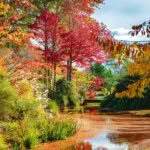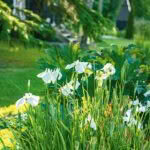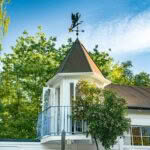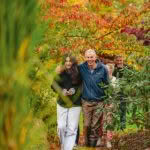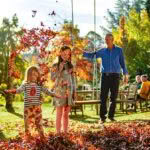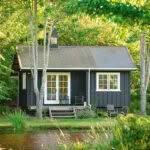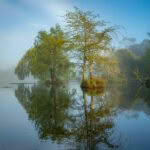‘Just get going’: The man behind this magical Upper Moutere garden tells aspiring gardeners to be fearless
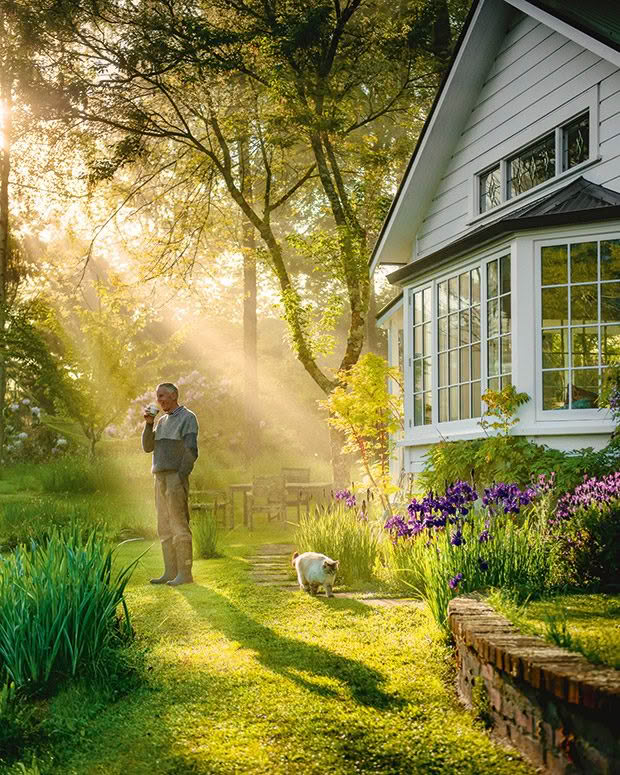
A neighbour’s cat, name unknown, often joined Michael Edwardes in his early morning cuppa to contemplate the peace of his creation. The cat seemed to enjoy the property as it was there most mornings until its owners moved away.
After 40-plus years of developing a large property, Michael Edwardes is beginning to recognize that he is more than okay at this gardening business.
Words: Kate Coughlan Photos: Daniel Allen
“Why don’t more people garden?” wonders Michael Edwardes. “It just seems natural to me.” He pauses along the leafy paths of his four-hectare woodland and wetland garden north of Nelson near Upper Moutere, and one has to agree. Why wouldn’t everyone aspire to have such a glorious place to call home?
Views to the Richmond Ranges in the west stretch across the reflecting waters of a two-hectare lake. Ducks are noisily sorting out their business. Autumn leaves rustle as they fall and light dapples in pools under the elegant arms of tall trees. A bucolic calm pervades.
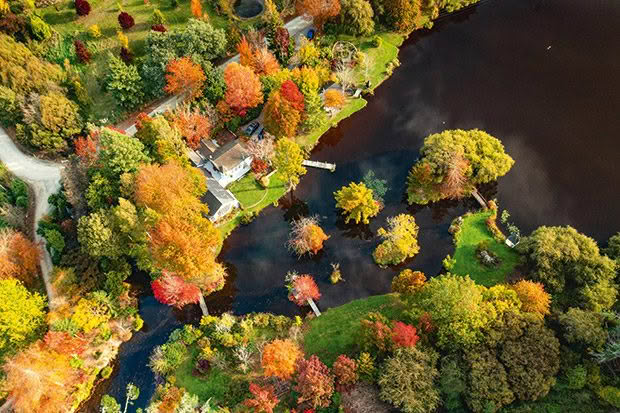
When it comes to gardening ability, Michael thinks he has the “Dusty Springfield” syndrome; she didn’t rate herself as much of a singer. “She was invited to the United States to Atlantic Studios, where Aretha Franklin had recorded her big albums. Dusty was so intimidated she couldn’t sing for weeks, and when she did, she was pitch-perfect,” says Michael. “For me, if there are 100 things right and one wrong, it’s the wrong one that I think about.”
“I wonder if people are intimidated?” he says. “Perhaps they think gardeners are all old people going round spouting Latin plant names. But that’s not the case, not at all. To me, gardening is all about joy. I had three teenage girls visiting the garden recently, and I saw them racing up the steps under the old pine trees, laughing and jumping about, and I wished people could see that. That pleasure — the fun people get from being in a place that makes them feel good — is what gardening is about to me.”
Michael grew up between England and India, one of the last sons of the British Raj, and fetched up in Moutere in somewhat the same way as a character from James A Michener’s novel The Drifters might. It was the 1970s, after all.
“My friend Kenn Palmer and I left England, two 17-year-olds heading off around the world looking for adventure, and on our way from Australia to Canada, by absolute chance, we stopped here, in New Zealand. Kenn said he had an uncle in New Zealand, so why not visit him on the way to Canada?
- Michael tries to keep interest in the garden year-round, but autumn, with its starring performances by liquidambars, scarlet oaks and maples, is a hard show to beat.
- Winter brings forth the grandeur of evergreen foliage, the delicacy of flowering camellias and hellebores, then come snowdrops and bluebells in spring and a welter of flowers as summer rolls into the garden.
“We got off the boat from Australia, met these girls, and they said, ‘Would you like to come to a wine and cheese party?’ There was this old guy at the party — he must have been about 35 (I thought he was old) — and he said, ‘I have a bus and we are going to drive around the South Island. Do you want to join us for a small amount of money?’ We thought that was a great idea.
“There were seven guys and five girls. We slept and ate on the bus and had marvellous adventures throughout the South Island before the rough old thing broke down for the last time in Christchurch. The bus owner asked: ‘What are you jokers going to do now?’
- Siberian irises are moisture-loving and happy along the edge of the lake.
- Michael fell for the handmade griffin he spied in California and carried home in his luggage. By the time customs had claimed a goodly amount in duty, and it was installed atop the tower, the expense was a little out of proportion to the cost of the relocated school building he calls home.
- The wandering cat charmed Michael with its immodest love for a camera lens. He says azaleas are underrated for their hardiness and colours. When reflected in the lake during flowering, they remind him of lava pouring down a hillside.
“We thought we’d hitch up to Palmie where Kenn’s uncle and family lived. The owner said, ‘If you go to Nelson, you’ll probably get a job picking apples.’
“We arrived in Nelson in October, but of course, there are no apples to be picked then. We ended up at Stevens in Rīwaka, picking tobacco. The tobacco farmers tried to dissuade us when we turned up because we were young and thin and looked like boys who’d just arrived from London. ‘It’s very hard work and probably not for you,’ they said to convince us not to apply for the jobs. We said, ‘No, no, we’ll be able to do it’, and we did, but it was hard work, all right. We did the whole seven-month season. We became very good friends with the Stevens, and recently, I went to Bill Stevens [the son’s] 80th birthday.
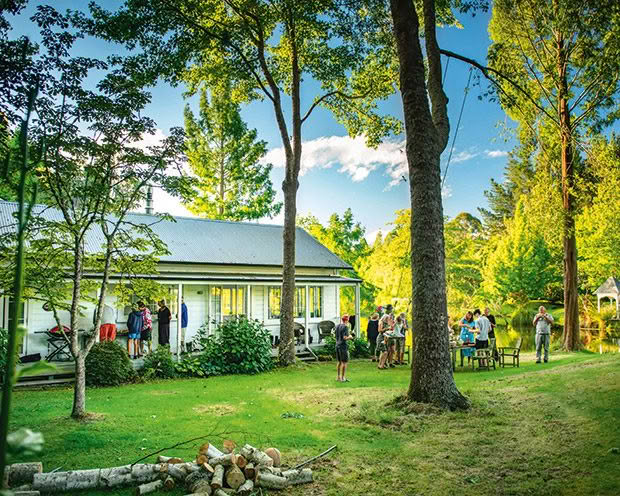
Michael started gardening around the house and gradually moved farther and farther out and out. “I didn’t really have a vision; I just made it up as I went along. I’m an amateur who likes gardening.” The area is often used for summer barbecues, including one, pre-Christmas, for his friends from the local table tennis club. He loves seeing the california quail scurrying around his property. “They are just lovely, especially when they have their babies in tow.”
“So that’s my story. I came as a backpacker, and I bless the lucky stars that I found New Zealand. I don’t feel Indian or British, but I felt like a New Zealander from the day I got here, and I’d not felt that elsewhere in the world before.”
The large gardens that now embrace Michael’s home so perfectly in the pretty countryside near Upper Moutere have emerged slowly and indeed over the four decades since he bought his land. The original scrubby covering of blackberry and bushy weeds was knocked back far enough in the 1980s to accommodate a relocated school from Tasman Street in central-city Nelson, which arrived on a truck. The boggy land that separates his from his brother’s adjacent property was turned into a magnificent lake. “My brother said, ‘It wants to be wet, so let’s make it even wetter.’ Instead of trying to drain it, we decided to make it a lake. My brother is clever at engineering.”
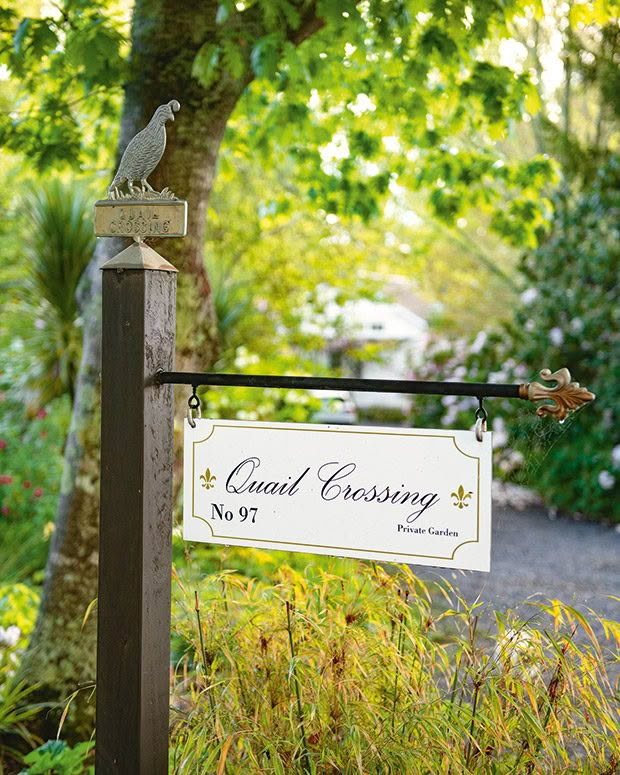
But while he was taming his land and coaxing it into good behaviour, turning it into a wooded wonderland around the lake edge, he was also spending a great deal of energy building his business as an importer and retailer of giftware and homewares. His shop, Copperfields, was a Nelson institution for decades. Gardening has always come third in his life.
“Family, business and then gardening, in that order,” he says. In addition to a brother living across the lake, Michael has another living across the ditch in Australia. They are regular visitors (pandemics permitting) to Michael’s home as they love his property and love New Zealand. Michael is lucky, he boasts, to have two lovely sisters-in-law.
“My father was a gardener, but he wasn’t a landscape gardener at all; he just had things all over the place, but I think that’s why I am a gardener because my father got me interested.”
- To the south of the house is a grove of californian redwoods he planted 40 years ago and was told he’d never live to see as adult specimens. They are now 30 metres high, and he reckons he is seeing them as “quite adult”.
- Michael’s brother Chris Edwardes (seated on the bridge) and his wife Sarah (black jacket) live close by, and their daughter Sophie (in white pants, and pictured above) is a regular visitor to the garden. Also on the bridge are neighbour Sophie McGill and her daughters Genevieve and Xanthe.
- The big trees close to the house are limbed-up, so sunlight can still get through and allow view shafts throughout the garden, such as this one from the northern boundary across woodland. Michael says people and plants are alike in that they both enjoy dappled light rather than too much shade or harsh sunlight.
It’s sometimes hard to catch Michael’s words over the loud remonstrations of waddling ducks holding court. If not the ducks, it’s likely to be a lamentation of black swans or a chorus of other birds delighting in landing in such a charming place. Their excitement is infectious and so loud it all but drowns out the quietly spoken Michael, who says that he has helped many friends get started on the gardening journey, and once they get going, they love it and never look back.
“One of the people I became friendly with during my importing days lives in Malvern in England, and when I went to visit them, they invited me for dinner. I was sitting in their living room looking at the garden and the garden was hopeless — a lilac tree immediately outside the house needed pruning as it was all diseased. I said, ‘I can’t stand it. I am going out to prune that lilac tree after dinner.’ My host said his wife had always wanted a garden, but she never knew where to start. They said, “When you come over next year, why don’t you spend a week with us, and we will garden?’
- Alba and Luma Callander, whose parents play table tennis with Michael, enjoy playing in a pile of liquidambar leaves.
- A self-contained cabin was extended recently with a small kitchen and living area. Family and friends stay there regularly.
- “Water and sunlight are a magical combination, especially in a vista framed by trees and shrubs.”
“So that’s what I did, and they had three adult sons who lived at home with their girlfriends, and they were all so outspoken it was hard to get a word in edgeways. The eldest was a real petrol head, and I thought he wouldn’t like the gardening work. But you know what? He took to it like a duck to water and loved it.
“We all worked together, and he even named it ‘turbo gardening.’ In 10 days, we did what you’d normally do in six to eight months. So, 20 years later, they still have that lovely garden, and they said the garden saved them during Covid times — they were lucky to have it during the long lockdowns.”
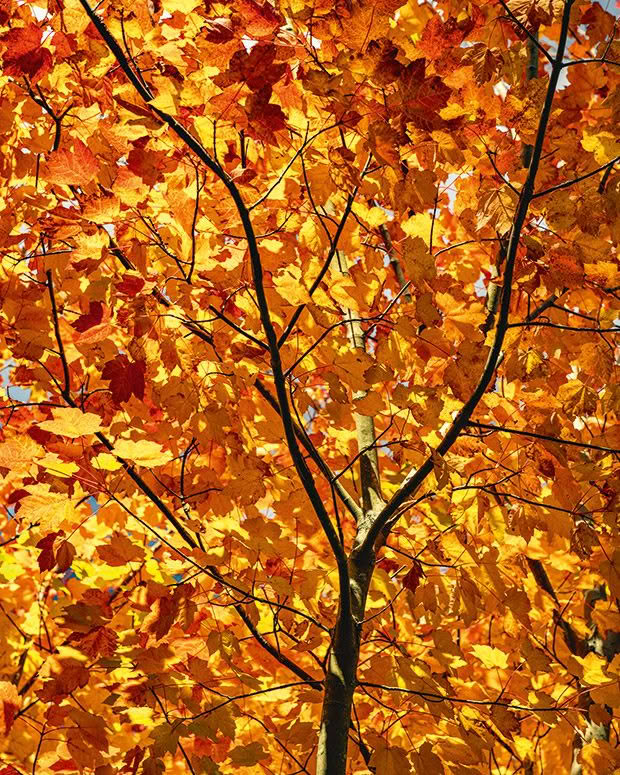
And so, it has gone: Michael doing the inspiring and quite a bit of the perspiring to help friends down the gardening path. So many people pay lip service to being green, and Michael thinks the world would be a better place if they stopped talking and took up gardening. “If I see people putting in fake grass or concreting over the soil, I am horrified by it. I want to help more people garden.”
After his retirement a couple of years ago, Michael began to plot how he could help create a television series inspiring people to get gardening. Unfortunately, a health setback that struck two years ago put the idea on the backburner. Now, he feels ready to begin again, having gotten the better of the illness. He’s eager to continue helping others starting their own journey up a gardening path and is very eager to explore the possibility of making a television series.
“Rather than a series about “experts”, I think about creating a sense of the excitement and joy that comes to people when they are in a lovely place. And then that might help people to think they want to get started themselves. Over the years, I’ve helped so many people here and overseas get started with gardening, and once they get past that initial fear of not knowing what they are doing and get going, they love it.”
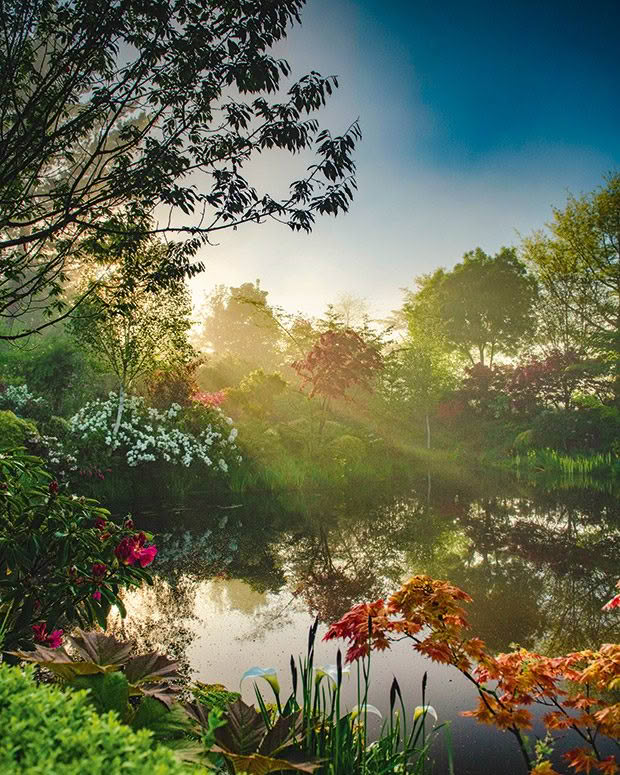
Cornus and azaleas reflect summer’s colours in one area of the lake, while its perfect stillness captures a replica of the willow and larch in another.
Michael maintains his property with the help of his good friend and neighbour Sue Gardiner, a knowledgeable plantswoman, and Paul Tunnicliffe, who mows the lawns and does various projects.
“Sue and Paul are an integral part of the garden,” he says. Quail Crossing is sometimes open for fundraising events and always for the annual Motueka Toy Library fundraiser. Michael is happy to allow private visits by appointment. He hasn’t joined the Gardens Trust, or any open garden forums, as he isn’t sure he believes in judging gardens. “It should be in the eye of the beholder, not in the view of a judge,” he says.
MICHAEL’S TWO TOP GARDENING TIPS
1. Get started: don’t try to solve all the problems at once. Make one nice area, which will inspire you to go a bit further. Plant trees as a first step — tough trees that do well in your area.
2. The biggest problem in the garden can turn into its best feature. We turned a horrible swamp into a beautiful lake. The original scrub, blackberry and stumps covering the place were pushed into piles, topped with soil and the contours create interest. It also saved the expense of taking away all the rubbish.
THREE OF MICHAEL’S FAVOURITE INTERNATIONAL GARDENS
1. Berchigranges, in Haute Vosges, eastern France, at 650-metres altitude, which shows the advantage of high rainfall.
2. La Louve, in Bonnieux, a small town in the Vaucluse area of Provence, is a series of garden rooms on a steep section overlooking the borrowed landscapes of the valley below.
3. Caher Bridge Garden in the heart of the Burren on the wild west coast of Ireland, near Ballyvaughan in County Clare, blends into its surrounding landscape magnificently.
Love this story? Subscribe now!
 This article first appeared in NZ Life & Leisure Magazine.
This article first appeared in NZ Life & Leisure Magazine.

